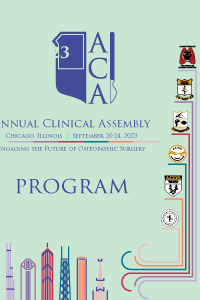Urological Surgery
Retrospective Review of Periurethral Lymph Node Dissection In Clinically Localized Prostate Cancer
Location: Grandball Room 1-2
- KK
Kevin Keating, D.O.
University of Michigan Health West
Grand Rapids, Michigan, United States
Primary Presenter(s)
Introduction/Purpose: Metastatic spread in localized prostate cancer is assessed operatively through pelvic lymph node dissection, which is carried out for intermediate and high grade cancer based on American Urological Association (AUA) guidelines. While pelvic lymph nodes have correlated with poorer prognosis, there is paucity evidence on the prognosis of patients with positive periurethral lymph nodes when performed robotically. The objective of this study was to evaluate the prevalence of and possible associations for secondary endpoints of tumor staging, prostate specific antigen (PSA), and biopsy grade, for positive periurethral lymph nodes during a robotic assisted radical prostatectomy (RARP).
Methods or Case Description: A retrospective review of our institution's electronic medical record was performed by utilizing prostate pathology reports following RARP from October 2011- February 2022. Data was analyzed for prevalence of positive periurethral lymph nodes.
Outcomes: The average PSA for those with a positive periurethral node was 17.60 (SD = 15.54) compared to a negative periurethral node was 7.60 (7.03). There was a statistically significant difference in mean rank tumor staging between those with versus those without a positive periurethral lymph node.
Conclusion: Periurethral lymphadenectomy is unlikely to replace pelvic lymphadenectomy for intermediate and high-risk patients; however, adding periurethral lymph node dissection could provide further prognostic information for surgeons. This study is limited due to its sample size and additional analysis is required to further understand the relationship between a positive periurethral lymph node compared to a pelvic lymph node.
Methods or Case Description: A retrospective review of our institution's electronic medical record was performed by utilizing prostate pathology reports following RARP from October 2011- February 2022. Data was analyzed for prevalence of positive periurethral lymph nodes.
Outcomes: The average PSA for those with a positive periurethral node was 17.60 (SD = 15.54) compared to a negative periurethral node was 7.60 (7.03). There was a statistically significant difference in mean rank tumor staging between those with versus those without a positive periurethral lymph node.
Conclusion: Periurethral lymphadenectomy is unlikely to replace pelvic lymphadenectomy for intermediate and high-risk patients; however, adding periurethral lymph node dissection could provide further prognostic information for surgeons. This study is limited due to its sample size and additional analysis is required to further understand the relationship between a positive periurethral lymph node compared to a pelvic lymph node.

